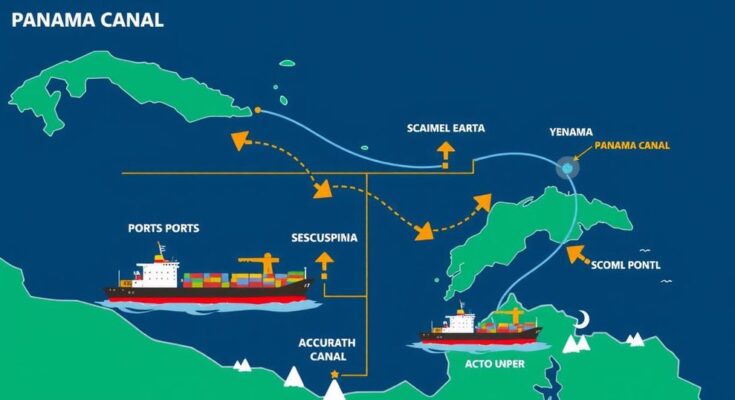CK Hutchison Holdings faces backlash from Beijing after selling its Panama Canal port stakes to BlackRock in a $23 billion deal. The transaction escalates geopolitical tensions, with Chinese officials warning against US collaboration. Analysts speculate US pressure played a role in the sale, while Hutchison navigates the risks of displeasing either superpower amidst criticism of prioritizing profit over national interests.
CK Hutchison Holdings, based in Hong Kong, has drawn significant criticism from Beijing following its decision to sell its stakes in the Panama Canal ports to the US investment giant, BlackRock. This $23 billion transaction, announced recently, has heightened geopolitical tensions, as Chinese officials accused Hutchison of prioritizing profits over national interests and warned against partnering with American entities.
The unexpected move to divest most of its global port assets, excluding those in China, includes the transfer of 43 container ports across 23 countries, notably the strategic Balboa and Cristobal docks at the Panama Canal, to investors led by BlackRock. Hutchison is expected to receive $19 billion in cash from this arrangement.
Speculation arises regarding potential US pressure influencing Hutchison’s decision to sell. Following his re-election, President Donald Trump has called for a reduction in China’s influence over vital waterways, leading observers to believe that Washington’s efforts to limit Chinese presence in Latin America might have played a role in Hutchison’s actions.
Beijing’s reaction has been notably strong, with state media openly denouncing Hutchison’s actions. A commentary in the pro-Beijing Ta Kung Pao publication accused the company of placing profits above national security, suggesting that the sale serves US strategic interests while jeopardizing China’s influence.
This editorial has been reiterated by government-affiliated offices, further emphasizing that aligning with US interests could damage Hutchison’s reputation and prospects in China. The commentary raised questions surrounding Hutchison’s willingness to relinquish critical ports to what it described as a hostile US firm.
Hutchison is now positioned precariously between the competing interests of the US and China. With potential backlash from either side, it faces a challenging decision: retreat may be viewed as yielding to Beijing, while proceeding with the sale could provoke regulatory repercussions in China, affecting its other business endeavours.
Historically, Chinese authorities have favored entrepreneurs who align their aims with national interests, as illustrated by referencing Hong Kong industrialist Chao Kuang-piu, who emphasized economic priorities during the socio-economic reforms of the 1970s. This serves as a clear hint from Beijing—commercial interests should not undermine national priorities.
While BlackRock, one of the leading investment firms globally, manages significant assets amounting to $11.5 trillion, it has maintained a low profile regarding this transaction despite its extensive business ties in China and Hong Kong. CEO Larry Fink’s previous dealings with President Trump could potentially amplify existing concerns surrounding geopolitical implications arising from BlackRock’s involvement in the Panama Canal’s port operations.
As opposition intensifies from Beijing, the deal may encounter regulatory headaches or diplomatic interventions. Should the sale be finalized, it would represent a strategic gain for the US in the region. Conversely, if China succeeds in pressuring Hutchison to withdraw, it would reinforce its control over significant infrastructure arrangements worldwide. Currently, CK Hutchison finds itself in a precarious predicament, with both the US and China exerting competing pressures.
The recent sale of Hutchison’s stakes in the Panama Canal ports has provoked strong reactions from China, indicating a complex geopolitical landscape. Hutchison’s decision underscores the delicate balance businesses must navigate amid rising tensions between superpowers. The future of this deal will be critical, as it could potentially reshape the dynamics of control over key global trade infrastructure in favor of the US or China.
Original Source: www.business-standard.com




